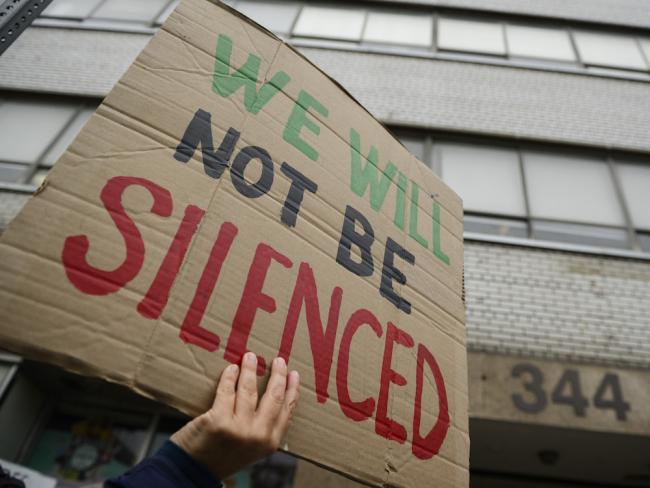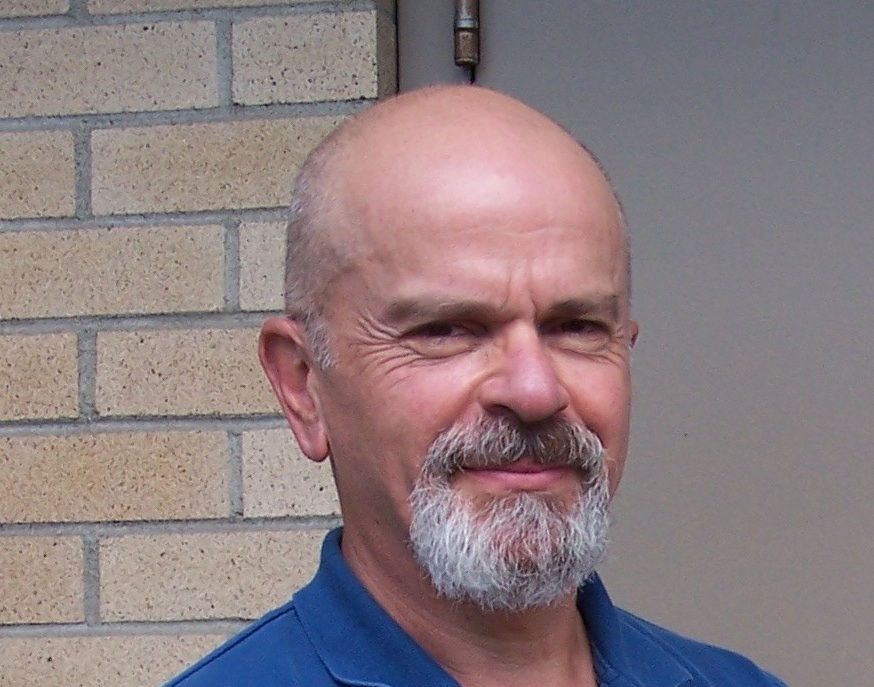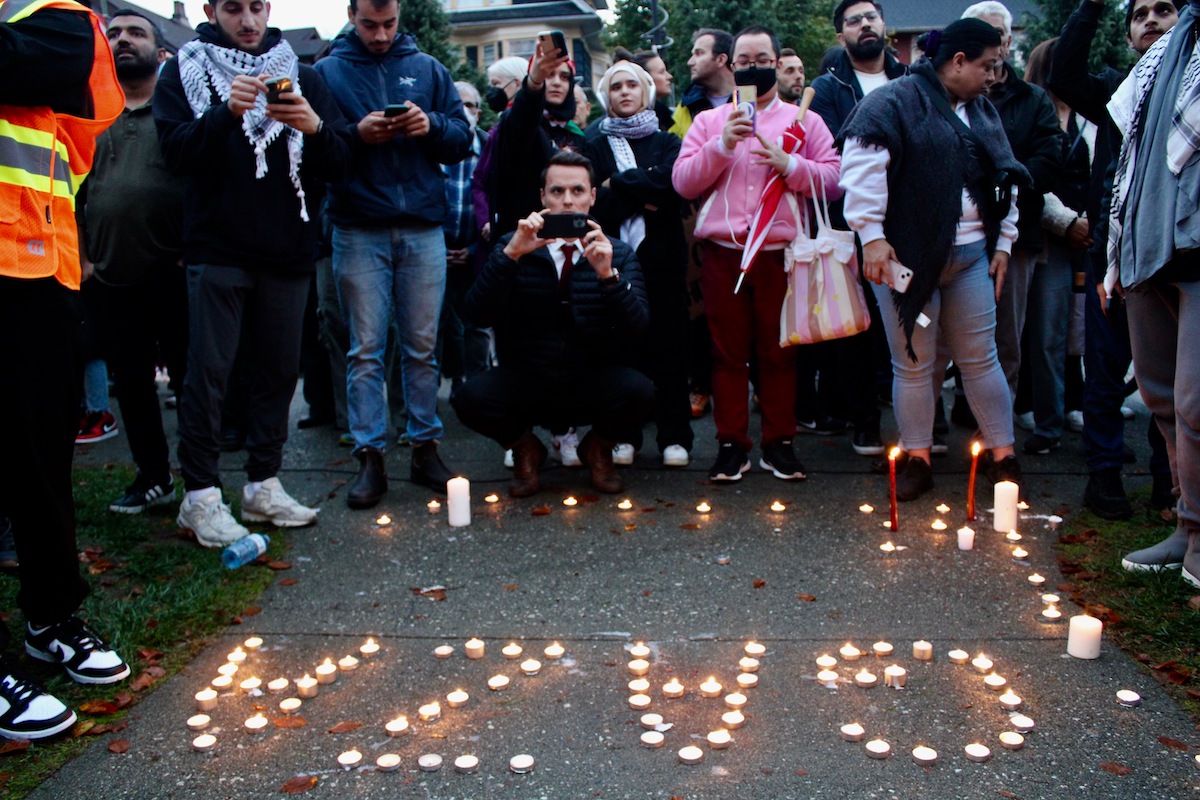Articles Menu

Nov. 7, 2023
It’s been one month since violence erupted in the Middle East.
On Oct. 7, Hamas militants broke through barbed wire fences separating the Gaza Strip from the rest of Israel. They killed 1,400 civilians, many in their homes or at a music festival, and took more than 200 hostages, most of whom remain in Gaza. It was the single deadliest day for Jewish people since the Holocaust.
Worldwide condemnation of the attack was swift. U.S. President Joe Biden, followed by Prime Minister Justin Trudeau, quickly affirmed support for Israel and its right to defend itself.
Almost as swift were calls for restraint. As Israel cut off food, water, fuel and electricity to the barricaded Gaza Strip, home to 2.3 million people, and began an air offensive, UN High Commissioner for Human Rights Volker Türk called on all parties to respect international human rights law and avoid targeting civilians.
On Monday, the death toll of Palestinians in Gaza surpassed 10,000, more than 40 per cent of them children, according to the Palestinian health authority. The grim milestone followed a weekend that saw tens of thousands of protesters in the United States alone calling for a ceasefire. Similar protests took place in major cities around the world, including Canada.
Many Jewish voices have been among those calling for an end to the humanitarian crisis and violence unfolding in Gaza. “Not in our name” became a rallying cry for Jewish-led protests that recently saw hundreds arrested in Washington and New York City.
The Tyee recently spoke with Vancouver-based Sid Shniad, founding member of Independent Jewish Voices Canada, an advocacy group formed in 2008 on principles of peace and justice in Israel. The organization is calling for an immediate ceasefire to allow humanitarian aid, water, food and fuel into Gaza. Then it wants the international community to address what Shniad described as “the underlying causes of this recurrent crisis.”
“Israel and people who support it unquestioningly like to give the impression that all Jews are onside with the Israeli project,” Shniad said. “Our views and values, we think, are much more universalistic and progressive.”

IJV endorses the three principles of the Boycott, Divestment and Sanctions, or BDS, movement, which calls for ending Israeli apartheid, recognizing Arab-Palestinian equality in Israel and allowing Palestinian refugees to return to their homes. The UN’s special rapporteur to the area characterizes the “deeply discriminatory dual legal and political system” in Gaza and the West Bank as “apartheid.” But the movement has also been described as antisemitic by pro-Israel organizations, such as the Anti-Defamation League, who say the principles seek to dismantle Israel as a Jewish state.
The history leading up to the current conflict is long. The Tyee’s conversation with Shniad was also long. It has been edited for length and clarity. For anyone wanting to better understand the history, beginning with the Zionist movement, which started in the late 19th century and led to the establishment of the State of Israel in 1948, Shniad recommended the following books: The Ethnic Cleansing of Palestine, by Ilan Pappé; Righteous Victims: A History of the Zionist-Arab Conflict, 1881-2001, by Benny Morris; and The Hundred Years’ War on Palestine, by Rashid Khalidi.
The Tyee spoke with Shniad the day after he co-organized, along with the University of British Columbia’s Solidarity for Palestinian Human Rights, a talk by Vancouver trauma expert and Holocaust survivor Dr. Gabor Maté. The 400-seat venue was full, with overflow of more than 1,000 people listening outside, Shniad said.
The Tyee: I want to acknowledge how difficult this conflict is to speak about. I think a lot of people feel that they shouldn’t talk about it, either because they don’t know enough or because they might say the wrong thing. What is your advice to them?
Sid Shniad: They should become informed on this. It’s long past time when it’s legitimate to say, “Oh, it’s too complicated” or “I’ll look away from this.” It’s incumbent upon all of us to come to grips with the history of Palestine and Israel, how Israel came into existence and what has been unfolding over the last 75 years that has gotten us to this terrible human crisis that we’re looking at today. It’s not good enough to avert our eyes. The human pain and misery and death and suffering has to be brought to an end and people have to begin to look to the heart of the problem, where it originates and what needs to be done to put it to an end. Looking away or claiming ignorance is no longer a sufficient excuse.
Canada is one of the few countries that has avoided calling for a ceasefire. Why do you think that is?
I think that Canada, unfortunately, is attached at the hip to whatever Washington, D.C., is pursuing by way of strategies and priorities. The U.S. is giving everything Israel wants. Canada appears to be an unparalleled junior partner. I think it’s outrageous and disgraceful. Canada likes to pose as the progressive peacemaking influence in the world and here you have an opportunity for it to play just such a role. It is backing off and equivocating and making all sorts of excuses why it can’t do that.
Jewish people have led and joined calls for peace around the world, even as they are grieving the Oct. 7 attack by Hamas. Where does that come from, the strength to speak out and say that this response is not OK?
When I was a kid, I saw instances where the State of Israel was giving out medals to “righteous gentiles” who had stood up and defended Jews in Nazi Germany and eastern Europe, in Poland under Nazi occupation, at peril to their own lives. I thought, if I was ever confronted by a situation in which other people were facing such peril, I didn’t want to be found wanting. I didn’t want to be looking the other way or making excuses why I didn’t do anything to protect them.
I think the situation in Gaza today is emblematic of that. I cannot sit still and let that happen without doing everything in my power to bring people onside with those who oppose it and want to put an end to it as soon as possible.
How do you respond to people who say that Israel has a right to defend itself after Hamas’s attack?
Self-defence does not give Israel or anybody else carte blanche to attack the civilian population and violate international law and human rights law. About two or three days ago, Israel said they had located a major Hamas official in Jabalia refugee camp. They dropped a bomb right in the middle of the building that he was claimed by the Israelis to be living in and killed almost 200 civilians. If that can be construed as self-defence, the phrase doesn’t mean anything.
I’ve heard it said that Hamas’s attack on Oct. 7 was designed to elicit this kind of response. Do you think that’s true?
I think there’s a strong possibility that they intended to elicit an enormous response, perhaps a mindless response. I don’t mean in the magnitude and the focus on the civilian population of Gaza, but to lure Israeli forces into house-to-house fighting in Gaza, where they have fortifications underground and things like that. It wouldn’t surprise me if that was their intention and part of their strategy.
Have you spent time in Israel?
I went on a solidarity tour organized by Independent Jewish Voices in 2010. We visited progressive Israeli activists and Palestinian friends and allies living in the West Bank. What I saw there was searing. One of the most horrific experiences I ever had was visiting the Israeli-occupied Palestinian city of Hebron, where 400 settler families are being protected by the Israeli army in an occupation that has effectively closed down the city.
The Israeli government has imposed military occupation on the West Bank, so the people there live under military law. Since 1967, increasing numbers of Jews have been moving in, what we call settlers; they’re setting up enclaves and pushing out the Palestinian population in increasing numbers. All of occupied West Bank is illegal under international law. The UN has declared it repeatedly illegal. Israel and its supporters refer to it as “disputed territory.” The international community does not dispute it.
A significant number of settlers occupied Gaza, as well, but [after increasing confrontations] Israel withdrew its settlers in 2005 and sealed off the borders. This Gaza enclave has been characterized as the largest open-air prison camp in the world.
In the West Bank, the majority of the Palestinians voted for Mahmoud Abbas and the Fatah, the faction of the Palestine political movement. In Gaza, the population voted majority for Hamas. Ever since then, there’s been abject hostility toward Gaza and more and more brutal treatment.
People often confront the Palestinians with “Why don’t you renounce violence and engage in non-violent confrontation with the government of Israel?” They have tried that. There was something called the Great March of Return that was organized by the people of Palestine, not Hamas, in 2018. Masses of them walked to the edge of the surrounding wall that was constructed by Israel, announcing their intention to return to the parts of Palestine that they’ve been forcibly removed from by Israel. Rather than acknowledge the legitimacy of what they were doing, or respond to their demands, Israel put in place something like 100 snipers, who proceeded to shoot them down, murdering hundreds of them.
That’s the background against which the recent event developed. Then you say, “How do you respond to Hamas’s attack on Oct. 7?” I respond that these are horrific attacks, that civilians should never be attacked by military forces. Having said that, what happened on Oct. 7 didn’t arise from nothing. If you really want to prevent another Oct. 7, I would suggest that you don’t do it by murdering 10,000 civilians. You acknowledge and address their needs, their desires, their demands, not only materially but politically, and allow them to live as normal human beings.
I’ve seen it said over these past weeks that opposing Zionism is antisemitism. Do you see, particularly with antisemitism on the rise, a danger in conflating criticism of Israeli politics with antisemitism?
You have hit the nail on the head. Israel defends itself ideologically by saying that opposing Israel and its defenders, people who believe in the Israeli project, is antisemitic because Israel is the embodiment of the Jewish people. People like me say we’re opposed to Israel because it is an ethnocratic state that privileges one people over another. We don’t believe in ethnocratic states, whether they’re Jewish or Muslim or Christian or Buddhist. We believe in the liberal notion of the state, and that is equality of all citizens before the law and in relation to the state. To oppose a state that institutionalizes the privilege of one people and discrimination against another is hardly antisemitism.

I wanted to ask you about the rallies that have been happening across Canada. I think you’ve attended a number in Vancouver —
They’ve been huge and unprecedented, spirited, focused — really inspiring. This is why I have a view that things are changing. There is a widening gulf between the people and the political classes in this country, in Britain, Europe and the United States, with these governments giving unqualified support to Israel and the people saying, “My God, stop this slaughter.” The tone-deafness of our politicians is unbelievable.
I hear a lot of people, including politicians, saying that the rallies are everything from pro-Palestinian to anti-Israel to celebrations of terrorism. One speaker talked about the “amazing, brilliant offensive waged on Oct. 7.” I’m curious to know, what’s the messaging you’re hearing?
That rally opened with an announcement from the lead organizer, from the Palestinian Youth Movement, that there will be no antisemitism tolerated in this demonstration. That was reiterated. There were several speakers in a row that were excellent and on point. Then came this one speaker who made the statement that you just quoted, and people in the crowd are looking at each other. That statement sounds like an endorsement of everything that happened on Oct. 7, and I think there is widespread revulsion among the Palestine solidarity movement members to what happened to civilians in Israel on that day. So that is far from being endorsed. It’s being rejected.
I’m sure you read the letter the other day by the director of the New York office of the UN High Commissioner for Human Rights who was stepping down. He called for the “establishment of a single democratic secular state in all of historic Palestine.” He was accused of antisemitism. What are your thoughts on that?
One, he’s a wonderful, courageous man. It would be great if more people who occupied sensitive and important positions would stand on principle and declare where they stand and make it clear what’s right and what’s wrong in these situations.
His call is for a single state where everyone is equal. That’s what I was talking about before — a liberal democracy as opposed to an ethnocracy in which Jews are privileged over non-Jews. I think that’s eminently reasonable. I think it’s preposterous to say it’s antisemitic to call for equality of everyone before the law.
The UN has tried for years to sanction Israel —
The way that I would put it is that the UN has not been able to take action against Israel because the U.S. has blocked attempts to take such action. When non-binding motions criticizing Israel have been raised in the General Assembly, the United States and Israel and Vanuatu and the Marshall Islands vote “no.” When attempts have been made to sanction Israel at the Security Council, the U.S. has used its veto power to stop them.
Given that, I think a lot of people are watching what’s unfolding and feeling helpless. What’s your advice to them? What can people do right here in B.C.?
They need to start with what we began with in this conversation, which is educating themselves and becoming fully conversant in the core issues that are at stake here. Once they’re confident about that, or in the process of becoming conversant with these issues, they need to reach out to others who share their concerns. Work with them and link up with people like IJV, people in the Palestinian community, people in the church community, to organize political pressures on our political masters to force political change on this.
Justin Trudeau and his cabinet are under tremendous pressure. Jagmeet Singh and the NDP were very equivocal on this initially, and they have changed. Their caucus says, “Endorse a ceasefire.” The reason they’ve changed is because they have felt that political pressure. Anybody who has the potential to influence the federal government, members of the government, MPs, advisers, letters to the editor — anything that can help reinforce change in popular understanding and the political position of our institutions on this.
What, if anything, gives you hope right now?
You should have seen the electric excitement in that speech that Gabor Maté gave last night, and the atmosphere outside of the people who didn’t get in. It was convivial. It was like, “There are other people out there who understand the world the way I do. I don’t have to suffer this alone.” Then you brainstorm about what you can do, even on the smallest scale locally, and build out from there.
Having done this within IJV for going on 15 years, let me tell you, we started with eight people. We’ve got more than 1,000 members across the country now. The applications to join IJV are cascading in in the context of this current crisis in Gaza. People want to work with other like-minded people to effect exactly the kind of progressive, humane change, to put an end to this horrible crisis, to say, “This must stop.”
We must get to the roots of the problem and address that, not engage periodically in ever-escalating military assaults on the people who are the victims of this ongoing horror story.
Amanda Follett Hosgood is The Tyee’s northern B.C. reporter. She lives in Wet’suwet’en territory. Find her on Twitter @amandajfollett.
[Top photo: Pro-Palestine demonstrators protest in front of Deputy Prime Minister Chrystia Freeland’s office in Toronto on Oct. 30. Photo by Christopher Katsarov, the Canadian Press.]